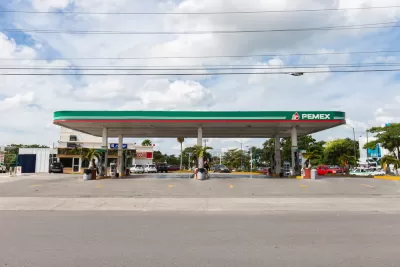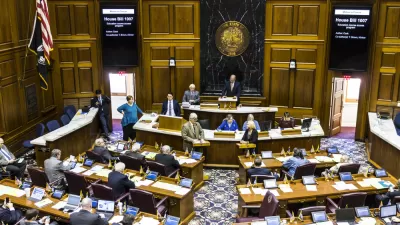The Democratic-controlled New Mexico legislature passed a 5-cents per gallon fuel tax increase and the Republican-controlled Assembly in Wisconsin backed a plan to apply sales tax to fuel, but their Republican governors oppose any tax hikes.

Efforts to increase transportation funding through hiking user fees continue to make significant process in 2017, but getting to the finish line is extremely challenging. An effort in Louisiana to hike gas taxes 17 cents per gallon, posted May 25, faces the "California challenge" of meeting a two-thirds supermajority legislative threshold, but has the support of Democratic Gov. John Bel Edwards. Backers delayed a vote until next week, reports the Associated Press.
In New Mexico, Senate Bill 2, sponsored by Representative Jim R. Trujillo - (D) and Senator Clemente Sanchez - (D) hikes gas and diesel taxes by five cents per gallon and add a $55 registration fee on interstate freight trucks. It passed the Democratic-controlled legislature on May 25, but Republican Gov. Susana Martinez vows to veto any tax hikes, reports the Associated Press.
Chances of a legislative override, as was done on May 10 by South Carolina's Republican-controlled legislature over Republican Gov. Henry McMaster's veto of the 12-cents per gallon gas tax hike, or by Nebraska's Republican-controlled unicameral legislature over Republican Gov. Pete Ricketts in May 2015 of the 6-cents per gallon gas tax increase, would appear to be extremely unlikely.
"The bill passed 37-28 along mostly partisan lines, with conservative state Rep. Candie Sweetser, D-Deming, joining all Republicans present in voting no," according to the NM Political Report.
In Wisconsin, a comprehensive tax reform package titled "The Road to a Flat Tax" by Representative Dale Kooyenga includes "applying the 5 percent state sales tax to fuel purchases while cutting the 30.9-cent per-gallon fuel tax by 4.8 cents," report Matthew Defour and Mark Sommerhauser on May 5 for the Wisconsin State Journal
Together, those changes net an increase of about $380 million in revenue for roads, bridges and transit over the next two years, according to an estimate from the nonpartisan Legislative Fiscal Bureau.
The plan would create an annual fee of $30 for hybrid vehicles and $125 for electric vehicles, yielding about $4.8 million over the next two years, and seek federal approval to begin tolling U.S. interstates in Wisconsin.
The plan also calls for rolling back the state’s minimum markup requirement for fuel sales, which Assembly Republicans predict will cause the overall price of fuel to decline, despite the new sales tax on fuel.
The proposal is backed by more than 40 of the 64 Republican members of the 99 member state Assembly, including Speaker Robin Vos, R-Rochester. The plan is blasted by Assembly Democrats because of what they view as regressive changes to the income tax. So far it has received a mixed reception by the Republican-controlled state Senate.
Gov. Scott Walker's approach
LIke his Republican counterparts in New Mexico, South Carolina, and Nebraska, Gov. Scott Walker opposes any tax hikes.
Walker’s budget calls for closing a nearly $1 billion shortfall in the transportation fund with $500 million in borrowing, delaying some major projects and transferring money from the general fund. He also is increasing funding for county and municipal road aid, though local government officials have said it’s not enough to address their long-term costs.
That approach, which Walker encapsulated in a May 25 press release, "Get it Done," was not received well by Assembly Majority Leader Jim Steineke (R-Kaukauna), according to WTAQ:
“Everybody we talk to thinks it’s crazy to delay projects and make them more expensive in the future, or…just continue to put the cost of these things on the credit card,” he said. “Everybody I talk to thinks that we should pay for it as we go.”
Hat tip to AASHTO Daily Transportation Update.
FULL STORY: Assembly GOP plan overhaul fuel taxes, steers state toward flat income tax

Alabama: Trump Terminates Settlements for Black Communities Harmed By Raw Sewage
Trump deemed the landmark civil rights agreement “illegal DEI and environmental justice policy.”

Study: Maui’s Plan to Convert Vacation Rentals to Long-Term Housing Could Cause Nearly $1 Billion Economic Loss
The plan would reduce visitor accommodation by 25% resulting in 1,900 jobs lost.

Planetizen Federal Action Tracker
A weekly monitor of how Trump’s orders and actions are impacting planners and planning in America.

Wind Energy on the Rise Despite Federal Policy Reversal
The Trump administration is revoking federal support for renewable energy, but demand for new projects continues unabated.

Passengers Flock to Caltrain After Electrification
The new electric trains are running faster and more reliably, leading to strong ridership growth on the Bay Area rail system.

Texas Churches Rally Behind ‘Yes in God’s Back Yard’ Legislation
Religious leaders want the state to reduce zoning regulations to streamline leasing church-owned land to housing developers.
Urban Design for Planners 1: Software Tools
This six-course series explores essential urban design concepts using open source software and equips planners with the tools they need to participate fully in the urban design process.
Planning for Universal Design
Learn the tools for implementing Universal Design in planning regulations.
Caltrans
Smith Gee Studio
Institute for Housing and Urban Development Studies (IHS)
City of Grandview
Harvard GSD Executive Education
Toledo-Lucas County Plan Commissions
Salt Lake City
NYU Wagner Graduate School of Public Service





























